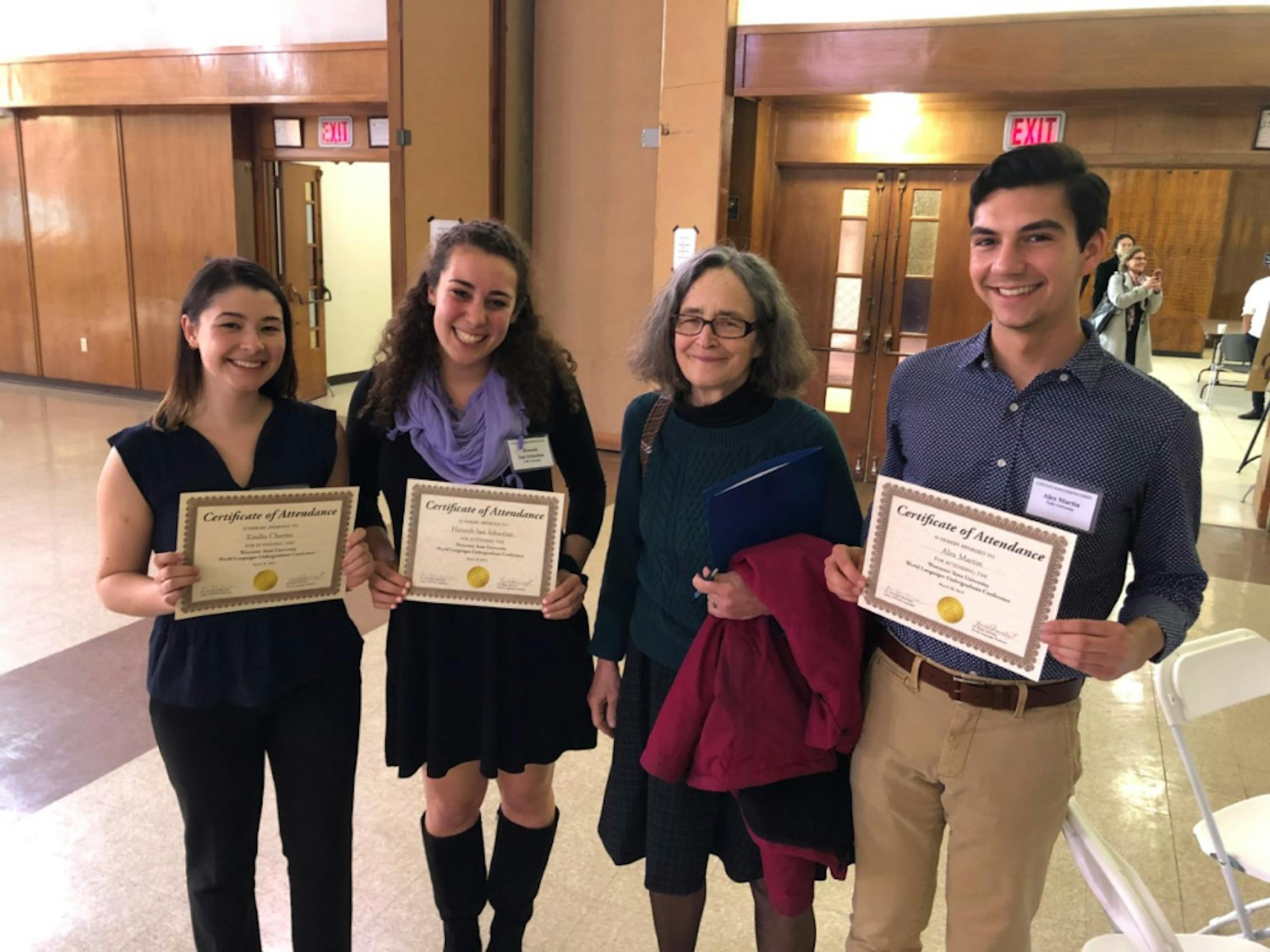The second annual Tufts Spanish Conference has arrived!
The Spanish Conference is an opportunity for students in Spanish courses in levels 22 and above to share their research in an immersive Spanish environment. It will be held on Saturday, April 9 in the Olin Center, rooms 002 and 007. The topic of this year’s conference ranges from literature and art to the representation of poverty within plays, and even to bilingualism. Although the Spanish Language Conference is only in its sophomore year at Tufts, the idea has been brewing since 2019.
This year, the conference has been organized by seniors Hannah San Sebastian, Jacob Freudberg, Samantha Wilner and junior Eden Maddy. Additionally, Part-Time Lecturer in the Department of Romance Studies Patricia Smith and Senior Lecturer in Spanish Kathleen Pollakowski are the faculty advisors.
Smith recounted how the idea to host a Spanish language conference at Tufts came about.
“It all really started … three years ago when, in my Spanish Civil War class, the students had done fantastic presentations. And during the semester, I got an email from Worcester State University, which was sent to colleges all over Massachusetts, inviting people to participate in their conference,” Smith said. “Three of the students in my Spanish Civil War class were interested… Hannah San Sebastian, Alex Martin and Emilia Charno.”
The group took the train to Worcester to attend the conference.
“The three of us went to Worcester for the day, and we presented our research. Mine was on how Spain remembers the Franco regime, as opposed to how Germany remembers Hitler,” Hannah San Sebastian, a senior double majoring in French and Spanish, said.
The excitement from presenting their research in Spanish at the Worcester conference prompted San Sebastian, Martin and Charno to begin planning for an immersive Spanish conference at Tufts. However, the COVID-19 pandemic hindered their plans.
“The [conference] in Worcester was in 2019. And then 2020 … that was [COVID-19], and we were planning and talking so there was no conference then. … And then 2021 was our first, hopefully annual, Spanish language conference,” Smith said.
Due to COVID-19 restrictions, the 2021 conference was held virtually; however, the conference will be held in a hybrid format this year with most presentations being in person. There will be two presentations running at once per panel, so attendees will have a choice of which presentation to attend.
“[We] just keep wondering, you know, how is this going to be maneuvered? Will we have technical problems? And we are going to have an employee from Tufts IT department with us all day long … and that makes us feel 100% better,” Smith said.
In addition to student presenters, there will be two keynote speakers.
“The first keynote speaker will be Ian Althouse, a Tufts alum with a Ph.D in Spanish (concentration in contemporary Latin American literature) from Yale University. The title of his talk is “Pseudónimos y pseuodociencia: Cómo el arte puede alucidar el propósito de los catálogos en las novelas de Roberto Bolaño.” And the second keynote will be given by Prof. José Antonio Mazzotti (from our department, Romance Studies), “La importancia de la investigación en el aprendizaje del español (y en la vida),” Pollakowski wrote in a follow-up email to the Daily.
After the individual presentations, there will be Q&A panels in groups based on the research topics.
“Students are also divided into panels of similar topics, so for example, I’m presenting on literature from the Middle Ages, and so I’m with a bunch of students with similar topics, [and] at the end of our panel, a professor will be doing a Q&A,” San Sebastian said.
Students cited the main reason for their interest in the conference to be the opportunity to present research, as it often seems like only STEM students get that chance.
“I kind of wanted an opportunity to share my research because there’s not very many opportunities to do that within the Spanish major,” Eden Maddy, a junior double majoring in International Relations and Spanish, said.
Most presenters are sharing continuations of research that they began in their respective Spanish courses.
“For the most part, it’s research students have done in class, [but] it could be individual research,” San Sebastian said.
Pollakowski noted that most of this research comes from the fall semester.
“Because of when we give [the conference] — in the spring — … a lot of the research comes from the fall,” Pollakowski said.
The organizers of the conference have been planning the event since October 2021.
“We meet for an hour every other week … And in between then we always have tasks … When people were sending in applications, I was processing those, and I was responding to people … [who] asked me questions,” San Sebastian said. “Some of the other students have been in charge of creating the posters to advertise, creating Facebook events to advertise, and then we’ve also been in touch with one of the keynote speakers.”
Maddy discussed how planning the conference was a collaborative process.
“We meet regularly and discuss logistics and what we’re going to do, and it’s been awesome getting to collaborate with the professors and talk to them outside of the classroom environment,” Maddy said.
All students who are interested in participating go through the same process to present.
“The students have been asked to send in their proposals and the title of their presentation, and they have PowerPoints that go with them. They’ve been sending them in to an email, which Alex and Hannah and Emilia created … a year and a half ago called tuftsspanishconference@gmail.com,” Smith said.
The conference welcomes anyone who is eager to listen to the hard work of its presenters.
“I think it’s just very cool how… even within one department — the Spanish department — there’s just such a diverse range of interests and research,” San Sebastian said. “[It’s] so cool [that] we get to showcase that.”






